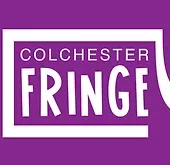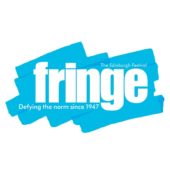
Guest blogger, Gwen Coburn shares her latest EdFringe reflections…
There’s this moment in my show when the jokes stop working. Like, completely stop. The audience shifts in their seats, the laughter dies down, and suddenly we’re all just sitting there with something much heavier—trauma, violence, the messy reality of what it means to speak up in a world that would really rather you didn’t.
And in that silence, I feel it. That familiar panic crawling up from my stomach: Should I be funnier?
It’s such bullshit, this voice. But there it is anyway, whispering that I need to fix this moment, make it lighter, safer. Get them laughing again because that’s what I’m supposed to do, right?
“Be funnier” is the comedy equivalent of “smile more”—that insidious little directive that keeps women performing within these carefully drawn boundaries, always ready to soften the blow of our own existence with a punchline.
Depressing Numbers
Let’s (very briefly, don’t worry) talk statistics. Only 26% of professional stand-up comedians are women. In 2014, all ten of the top-paid comedians were male. By 2016, Amy Schumer managed to crack the list at number two—progress, I guess?
Here’s the big one for me: while 53% of women experience sexual harassment at work generally, that number jumps to 75% for female stand-up comedians. Twenty-five percent have been molested by a fellow comedian. Seems like this would have a pretty big impact on that first statistic. Yet, we keep having conversations about whether women are “naturally” funny, like that is the only possible reason for the discrepancy. There was this university study that claimed 63% of men are funnier than the average woman. What gets me about studies like this is they measure humor like it exists in a vacuum, completely divorced from the context that determines who gets to be heard, who controls mainstream media, who gets stage time, and whose jokes are deemed worthy of our attention in the first place.
The Impossible Math of Being a Woman in Comedy
When I was younger, I thought there were basically two types of women: the ones who played by the rules (traditionally feminine, agreeable, definitely not threatening anyone’s worldview) and the ones who rebelled against them (the “not like other girls” crowd, armed with sarcasm and a studied indifference to anything pink). I thought I had to pick a side, like it was some kind of feminist personality quiz. Looking back at how torn I was between wishing I could be more girly and how strongly I adopted the attitude of disgust towards being girly is cringe-worthy. More embarrassing than any old school photo.
As an adult, I know this is complete nonsense. Women aren’t defined by societal expectations of them, and I share my womanhood with all people who identify as women, regardless of whether we align with traditional standards or differ wildly from them.
But “be funnier” is a sneaky one. The truth is it isn’t really about being funnier. It’s about control. It puts women in this impossible position where we have to be funny enough to be taken seriously, but not so funny that we threaten the established order. Don’t be too dark, too angry, too honest. Don’t make anyone uncomfortable—unless it’s the right kind of uncomfortable, the kind that confirms rather than challenges how things already work.
It creates what I think of as a comedy trap. If we want to use humor at all, we feel like we have to use it constantly, justifying our presence with this perpetual performance of likability. God forbid we should have a moment of seriousness, of genuine emotion, of anything that might be deemed—gulp—unfunny.
The Thing About Mike Birbiglia
Here’s what really gets me: Mike Birbiglia exists. He’s out there making these beautiful, storytelling comedy shows where he uses humor to explore darker human experiences. His stuff is brilliant—he talks about trauma, about difficult relationships, about the messier parts of being human. And nobody questions whether what he’s doing is “really” comedy.
But Hannah Gadsby does essentially the same thing with Nanette—uses personal narrative, blends comedy with serious subject matter, challenges audiences to sit with uncomfortable truths—and suddenly there’s this whole conversation about whether this work belongs in the comedy category at all.
I know I’ll get pushback on this. Some will say Gadsby’s points are too emotional, too depressing, too real. To that I say, Bo Burnam’s Inside is haunting and we know it is comedy. Some will say that you have to write punchlines throughout for a special. Well I for one really enjoyed the special Rothaniel.
The difference isn’t in the work itself. It’s in who gets to control the narrative about pain, about trauma, about the complexities of human experience. When a male comedian uses humor to process difficult emotions, it’s sophisticated comedy storytelling. When it’s not a man that does it, we’re suddenly very concerned about the purity of the comedic form.
I heard recently about a woman who is doing a dramedy at Fringe. After her performance, an audience member actually scolded her, incensed that there weren’t enough jokes. Can you imagine? Someone so angry about the ratio of jokes to drama that they felt compelled to shout about it. I guarantee you that same person has never stormed out of a Mike Birbiglia show.
My Show Is Complicated and That’s the Point
My show is a play about gender violence in comedy. There’s plenty of comedy in it—actual standup jokes and comedy songs that have played at festivals across the US. But it’s also a drama. It’s a honed piece of writing that serves a specific purpose: to create community with an audience and look at how we can shift our view around gender violence.
Even knowing all this—even having thought about it deeply, written about it, performed it dozens of times—I still sometimes feel that panic in the pit of my stomach. In those dark moments when the play turns to drama, when we’re sitting with the weight of what it actually means to survive and speak up, I worry about being deemed an unfunny woman. It’s a very specific actor’s nightmare.
The irony isn’t lost on me. Here I am, making a show about how women are policed in comedy, while simultaneously policing myself? Meta on Meta.
Comedy Is Like Makeup (Stay With Me Here)
I keep coming back to this idea: comedy, for me, sometimes feels like wearing makeup. It’s fun, and there are times I genuinely love it. I’m always learning how to do it better, and when I get good at it I want to try new things out. I love finding the perfect way to tell a joke and watching an audience light up with recognition. But I have to keep reminding myself that doing this isn’t about fitting into who I’m supposed to be.
Just like makeup, comedy should be a choice, not a requirement for being taken seriously.
The expectations are brutal. As one comedian wrote, “if a woman performs badly it usually is made to reflect the entire gender” while “men could be mediocre and still praised, women would have to be outstanding comedians only to still be overlooked or downplayed.” The art of comedy is every day growing more innovative and expansive, but as women we get less leeway to be a part of that.
There’s something subversive about female stand-up comedy that goes way beyond just being funny. It puts women in positions of authority, literally elevated on a stage, controlling the narrative about their own experiences. Maybe that’s what makes “be funnier” so insidious—it’s not really about the quality of our humor. It’s about keeping us busy performing instead of taking control.
So Here’s What I’m Doing
I’m off to be funny now. And also to not be funny. To let my show exist in all its complexity—comedy and drama, light and dark, brutally funny and devastatingly serious. Because the most radical thing I can do isn’t to be funnier.
It’s to do what I came here to do: create connection and conversation, using comedy as I see fit.
Comedy and makeup are both fun, and there are times I love it, but I need to remind myself often that this isn’t about fitting into who I should be.
Heck, maybe I’ll even smile. If I feel like it.
Listen to our audio interview with Gwen here.

Gwen Coburn is an American writer, comedian, and performer bringing her musical comedy show, “Sad Girl Songs,” to the Edinburgh Fringe in 2025. The show takes place from August 1st to August 23rd at Ivy Studio, Greenside @ George Street, with performances at 15:10. “Sad Girl Songs” offers a blend of humor and personal storytelling, focusing on themes such as gender violence, trauma, modern womanhood, and the aftermath of abusive relationships. The show integrates references to Greek mythology, including the story of Medusa, exploring the ongoing impact of victim-blaming.
Book here.




























